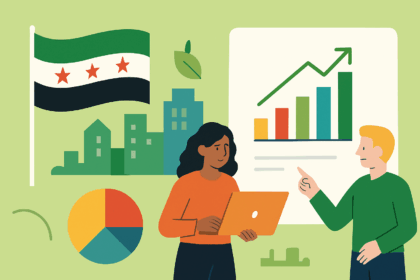
Planning Syria’s Future Cities: How Can Data Help Build a More Sustainable and Just Infrastructure?
- Planning Syrian cities requires a strategic vision based on data to achieve sustainability and justice.
- Data plays a pivotal role in understanding the needs of the population and improving resource use.
- Sustainability covers multiple sectors such as energy, water, and transport.
- Justice in infrastructure means providing equal access to essential services for all residents.
- Challenges in planning include data scarcity and ensuring its quality, but these can be overcome through effective strategies.
Table of Contents
- The Importance of Data in Modern Urban Planning
- Data as a Tool for Building Sustainable Infrastructure
- Data as a Tool for Building More Equitable Infrastructure
- The Role of “Insight Syria” in Supporting Future Urban Planning
- Challenges and How to Overcome Them
- Conclusion: Building a Better Syrian Future with Data
The Importance of Data in Modern Urban Planning
Urban planning has always relied on expertise and field knowledge, but our current era is witnessing a radical shift towards quantitative and qualitative data. Modern cities generate enormous amounts of data daily, from traffic patterns, and energy and water consumption, to demographic composition, economic activity, and social interactions. When collected and analyzed correctly, this data provides invaluable insights that enable planners and decision-makers to:
- Accurately understand population needs: Through demographic data analysis, areas with high population density, age groups most in need of services (such as schools and health facilities), and areas lacking basic services can be identified.
- Improve resource efficiency: Energy and water consumption data analysis, along with waste generation patterns, can help design more efficient systems, reduce waste, and encourage sustainable practices.
- Enhance social justice: By analyzing geographical and economic data, marginalized or underserved areas can be identified, directing resources to ensure fair distribution of services and infrastructure.
- Predict future needs: Analyzing population and economic trends can help predict future urban growth and plan the necessary infrastructure to accommodate this growth effectively.
- Evaluate environmental impact: Data can be used to model the environmental impacts of development projects, select the most sustainable solutions, and design cities capable of adapting to climate changes.
Data as a Tool for Building Sustainable Infrastructure
Sustainability in infrastructure is not just an environmental term but a comprehensive approach considering economic, social, and environmental dimensions over the long term. In the Syrian context, sustainability becomes imperative to ensure cities’ resilience and growth after years of challenges.
1. Sustainability in Energy and Water Sectors:
- Data Collection: Collect data on energy and water consumption at the neighborhood and building levels, renewable energy generation patterns (such as solar energy), available water sources, and waste levels.
- Analysis: Using advanced data analysis tools, identify areas of high consumption and potential waste, assess the feasibility of deploying renewable energy sources, and identify optimal sites for developing water and sanitation infrastructure.
- Outcome: Design more efficient energy and water networks, reduce reliance on traditional sources, promote renewable energy use, and ensure fair distribution of water.
2. Sustainability in Transport Sector:
- Data Collection: Includes traffic data (peak times, vehicle types, travel speeds), public transport usage patterns, road infrastructure data, and pedestrian and bicycle movement patterns.
- Analysis: Analyzing this data helps identify traffic bottlenecks, evaluate public transport network efficiency, determine the need to develop new roads or improve current ones, and plan safe routes for pedestrians and cyclists.
- Outcome: Design sustainable transport systems that reduce congestion and pollution, encourage public transport and bicycle use, and offer innovative mobility solutions.
3. Sustainability in Waste Management:
- Data Collection: Includes data on the quantities of waste generated by type and source, waste collection patterns, and landfill locations.
- Analysis: Analyzing this data can help identify recycling opportunities, improve waste collection systems, determine optimal sites for new waste treatment facilities, and encourage sustainable waste generation practices.
- Outcome: Develop effective waste management systems, reduce environmental impact, and promote a circular economy.
4. Sustainability in Green Urban Planning:
- Data Collection: Data on available green spaces, soil types, water sources, biodiversity, and energy consumption patterns in buildings.
- Analysis: Use this data to identify suitable areas for developing green spaces, design energy-efficient buildings, choose sustainable building techniques, and plan cities that harmonize with the natural environment.
- Outcome: Healthier cities, less affected by pollution, capable of providing better living environments for residents.
Data as a Tool for Building More Equitable Infrastructure
Equity in infrastructure means ensuring that all residents, regardless of their social, economic, or geographical backgrounds, have equal access to essential services and urban facilities. In Syria, where disparities might be increasing, achieving equity becomes crucial for rebuilding a cohesive society.
1. Analyzing Service Gaps:
- Data Collection: Detailed data on service distribution (education, health, water, electricity, sanitation, roads) by geographical area and population composition.
- Analysis: Compare the availability of services among different areas, identify areas severely lacking in services (gaps), and determine the underlying causes of these gaps (such as lack of investment, accessibility issues, etc.).
- Outcome: Develop targeted plans to direct resources towards the most needy areas and ensure fair distribution of basic services.
2. Ensuring Access to Economic Opportunities:
- Data Collection: Data on job distribution, availability of commercial and industrial facilities, income levels, and commuting patterns to access work.
- Analysis: Identify areas with a shortage of job opportunities, evaluate how easily residents can access these opportunities, and link this data with transport infrastructure data.
- Outcome: Plan residential areas close to work centers, develop effective transport networks connecting residential areas with economic activity centers, and support the establishment of economic projects in deprived areas.
3. Inclusivity in City Design:
- Data Collection: Data on the needs of vulnerable groups (seniors, people with disabilities, children, women) regarding access to public facilities, safety, and mobility.
- Analysis: Use this data to evaluate how current infrastructure meets these groups’ needs and determine the necessary improvements to ensure inclusivity.
- Outcome: Design cities that welcome everyone, with infrastructure that considers the needs of all segments of society by providing safe pathways, ramps, suitable facilities, and sufficient lighting.
4. Community Engagement in Decision-Making:
- Data Collection: Use surveys, focus groups, and digital participation platforms to gather residents’ opinions on their priorities and infrastructure needs.
- Analysis: Analyze these opinions to understand residents’ aspirations, determine their priorities, and integrate them into the planning process.
- Outcome: Cities built in partnership with their residents, meeting their real needs, and enhancing the sense of belonging and ownership.
The Role of “Insight Syria” in Supporting Future Urban Planning
At “Insight Syria,” we offer a comprehensive suite of services that play a critical role in enabling institutions to plan sustainable and equitable future Syrian cities. Our deep expertise in the Syrian market and our ability to accurately collect and analyze data make us the ideal partner for organizations seeking positive change.
1. Specialized Market Research:
We understand that understanding “market entry” in Syria requires more than just general data. We offer in-depth market research covering multiple aspects, including:
- Need Analysis: Identifying current and future population, commercial, and service needs.
- Competitor Analysis (if any): Understanding other players and their role in the sector.
- Feasibility Assessment: Studying the economic, social, and environmental feasibility of proposed projects.
- Identifying Opportunities and Challenges: Drawing a clear picture of the operational context.
2. Opinion Polls and Monitoring:
To ensure justice and inclusivity, we use advanced opinion polling methods to understand the aspirations and needs of different segments of society.
- Field Opinion Polls: Reaching various areas to gather residents’ opinions directly.
- Focus Groups: Organizing in-depth discussions with target groups to understand their perspectives.
- Monitoring and Evaluation: Following up on the impact of projects on the ground and collecting data to assess goal achievement.
3. Advanced Data Analysis:
We have a team of data scientists specializing in transforming raw data into actionable insights.
- Geographical and GIS Analysis: Linking data to geographical locations to create precise analytical maps.
- Advanced Statistical Analysis: Using statistical tools to identify trends and relationships between variables.
- Forecasting and Modeling: Building models to predict future needs and assess the impact of different scenarios.
- Data Visualization: Presenting results in visually and easily understandable ways for decision-makers.
4. Strategic Consulting:
We not only provide data but offer strategic consulting based on our deep analysis, to help institutions:
- Formulate Urban Development Plans: Integrate data into planning processes.
- Prioritize Projects: Direct resources towards the most impactful projects.
- Design Sustainable and Equitable Infrastructure: Ensure projects meet sustainability and equity standards.
- Risk Assessment and Challenge Management: Develop strategies to overcome difficulties.
Challenges and How to Overcome Them
Despite the immense potential of data, there are challenges that may face the planning of future Syrian cities:
- Lack of Available Data: Historical data may not be complete or useful. This can be overcome by efficiently gathering new data.
- Ensuring Data Quality: Inaccurate data can lead to wrong decisions. Strict protocols must be put in place to allow data validity verification.
- Security and Privacy Considerations: Collecting sensitive data requires strict protection. High standards for cybersecurity should be applied to ensure data protection.
- Lack of Local Expertise: There may not be enough specialists in data analysis. Investing in training local cadres is a possibility.
- Resistance to Change: Data-driven planning initiatives may face resistance from traditional stakeholders. Building trust with all concerned parties is necessary.
Conclusion: Building a Better Syrian Future with Data
Planning future Syrian cities is an invaluable opportunity to rebuild a stronger, more sustainable, and equitable society. This can only be achieved through a clear strategic vision, a commitment to innovation, and reliance on data as a fundamental tool at every stage of planning and implementation.
At “Insight Syria,” we are committed to supporting this vision. As a leading company in market research, opinion polls, and data analytics in Syria, we possess the capabilities and expertise needed to help the government, organizations, and companies understand challenges, identify opportunities, and make informed decisions.
If you seek a deeper understanding of the Syrian market, need support in planning your developmental projects, or want to build infrastructure that meets the needs of future generations, “Insight Syria” is your trusted partner. Let us work together to turn data into insights, and insights into tangible reality, to build more prosperous and just Syrian cities.



